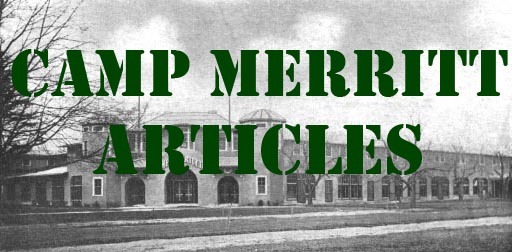
During World War I from August 1917 to June 30, 1920, 1,088,081 servicemen from all over the country past through Camp Merritt, the United States embarkation camp, which was located in the general area where Cresskill, Dumont, Tenafly, Closter, Harrington Park, Englewood, and Northvale are today.
The description of the negative effects the camp had revealed in the articles coincides with E. F. Morrow’s writing, along with the positive improvement of roads, are reflected in the news articles. Eugene Breen gives a lot of information on how baseball was a big part of the area at the turn of the century. Frank Brough’s page has articles on him and reveals the deep sense of patriotism throughout the area. His sister is mentioned a few times in singing and entertaining at Camp Merritt. His story is very moving. Particularly the letter sent home by a nurse brings one to tears. Harry Doremus must be mentioned for he was so beloved by the area. As you drive around, you may notice streets with his family name. He was 42 years old when he took the Regiment from Hackensack overseas. H. Kent Hewitt did escort missions across Atlantic and Mediterrenian and escorted President Wilson to the peace conference. From Hackensack, he became head of all naval forces at the end of World War II in the European Theater. Click on 1917 prohibition article on drunken driving. It helps to clarify partly why prohibition came about. The accidents and incidences caused by drunken behavior at Camp Merritt, and I am sure camps all over the United States, only added to its passage. Written by: |
Click on each individual year to view corresponding articles arranged by month |
| 1967 | 1999 | 2017 |
Year 1917 |
||
|
||
|
||
Year 1918 |
||
Year 1919 |
||
Year 1922 |
Year 1924 |
|
Year 1967 |
Year 1999 |
Year 2017 |